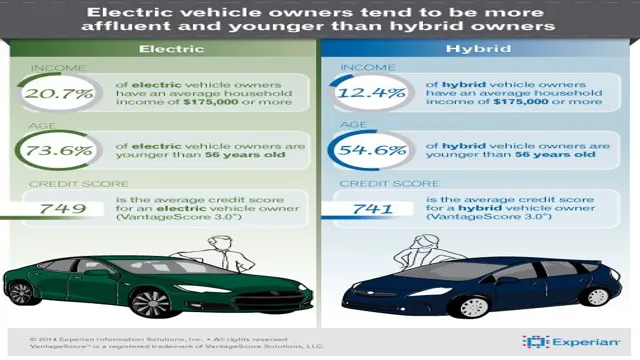The Ultimate Consumer Guide to Electric Cars: Everything You Need to Know before Buying!
Electric cars have been making waves in the automobile industry for quite some time now. With the growing concern over climate change, more consumers are becoming increasingly environmentally conscious and are looking for ways to lessen their carbon footprint. As a result, electric cars have gained immense popularity over the years and are now seen as a viable alternative to traditional gas-powered vehicles.
But with so many options available on the market, it can be challenging to navigate the world of electric cars and find the right one for your needs. That’s where an electric car consumer guide comes in handy. This guide provides valuable information on everything you need to know about electric cars, from the different types of electric cars to charging options, driving range, and maintenance.
If you’re in the market for an electric car and need help deciding which one is right for you, then an electric car consumer guide is a great place to start. With its detailed information and expert recommendations, you’ll be able to make an informed decision and find the perfect electric car that meets your needs and budget. So, what are you waiting for? Start exploring the world of electric cars and join the growing movement towards a greener, more sustainable future.
Overview of Electric Cars
Looking to go green and interested in an electric car? It’s important to do your research before making a purchase. As a consumer guide, electric cars offer a variety of benefits, including reduced emissions, lower fuel costs, and a quiet, smooth ride. However, there are also a few drawbacks to consider, such as limited range, longer charging times, and the higher upfront cost of electric vehicles.
It’s important to determine how far you typically drive and examine your daily driving habits to ensure that an electric car is practical for your needs. Additionally, it’s important to research the different models available and their respective features, such as battery size, charging options, and available amenities. With proper research and consideration, an electric car can be an excellent choice for both the environment and your wallet.
Advantages of Electric Cars
Electric cars have become increasingly popular over the years, and for good reason. These cars run entirely on electricity, meaning that they produce zero emissions while driving. This is not only better for the environment but also helps to reduce our dependence on fossil fuels.
Electric cars have the added advantage of being much cheaper to operate than traditional gasoline-powered cars. While the initial cost may be higher, the long-term savings on fuel and maintenance costs are substantial. Plus, electric cars are incredibly quiet and smooth to drive, providing a more comfortable ride for passengers.
As more charging stations are built and the technology continues to improve, electric cars are quickly becoming a more practical and accessible option for drivers everywhere.

Disadvantages of Electric Cars
Electric cars are the future of transportation, and there are many benefits associated with them. However, like any other technology, they also come with some drawbacks. The most significant disadvantage of electric cars is their limited driving range, which is usually much lower than that of a gasoline-powered vehicle.
Drivers must plan their trips carefully or risk running out of battery power and becoming stranded. Another disadvantage is that charging an electric car can take a long time, especially if it needs a full charge. This can be inconvenient for busy drivers who don’t have time to wait around for their car to charge.
Additionally, electric cars tend to be more expensive upfront, although they may save money on fuel costs over time. Finally, there are fewer charging stations available compared to gas stations, making long trips more challenging. Despite these disadvantages, electric cars have the potential to revolutionize the way we think about transportation, and improvements in technology may eventually eliminate many of the current drawbacks.
Choosing an Electric Car
Are you considering purchasing an electric car but don’t know where to begin? Well, you came to the right place! As a consumer guide for electric cars, it’s important to start by assessing your needs. What is your daily commute like? How far do you typically drive in a day? Do you have access to charging stations at work or home? Answering these questions will help determine the range capabilities you need in an electric car. Next, it’s important to compare models and their features.
Some electric cars offer longer ranges than others, while some have faster charging capabilities. Consider your budget and desired features when choosing a model. Lastly, don’t forget to factor in federal and state incentives for electric car purchases that can help offset costs.
Armed with this information, you can make an educated decision on which electric car is the right fit for you.
Factors to Consider
When it comes to choosing an electric car, there are several factors to consider before making a purchase. The first factor to keep in mind is the vehicle’s driving range, as this can impact how far you can travel before needing to recharge. Another important consideration is the car’s charging infrastructure, as this can affect where and how you can charge your vehicle.
It’s also essential to think about the car’s size and interior space, as well as its safety ratings and overall reliability. And lastly, don’t forget to consider the cost of electric cars, including maintenance costs, as they can often be more expensive than traditional gas-powered vehicles. By carefully weighing these various factors, you’ll be able to choose an electric car that meets your needs and fits within your budget while also helping to reduce your carbon footprint on the environment.
Best Electric Cars on the Market
When it comes to choosing an electric car, there are several important factors to consider. First and foremost, you will want to make sure that the car has enough range to meet your daily needs. Most electric cars can travel around 100-250 miles on a full charge, but some models offer even more range.
It’s also important to think about the type of driving you will be doing. Will you be using the car for long road trips or just for commuting around town? Additionally, you’ll want to consider the charging options available to you. Does your home have a charging station, or will you need to rely on public charging stations? Finally, you’ll want to weigh the pros and cons of different models, looking at factors such as cost, features, and driving experience.
With so many great electric cars on the market today, you’re sure to find one that meets your needs and fits your budget.
Cost Comparison with Gasoline Cars
Choosing an Electric Car When it comes to purchasing a car, many factors need to be considered, including the cost of running and maintaining the vehicle. One key factor to consider is the cost of fuel. Electric cars are becoming increasingly popular due in part to their low running costs when compared to gasoline cars.
While gasoline prices fluctuate, the cost of charging an electric vehicle remains stable. The cost per mile for an electric car is typically much lower than for a gasoline car due to the higher fuel efficiency and lower maintenance costs. Despite the higher upfront cost of purchasing an electric car, the savings over the life of the vehicle can be significant.
Plus, you’ll be contributing to a cleaner environment and reducing your carbon footprint. Overall, choosing an electric car can be a smart and cost-effective decision, especially for those concerned about the long-term impact of their vehicle on both their wallet and the environment.
Owning and Operating an Electric Car
As electric cars gain popularity, more and more consumers are considering making the switch from gas-powered vehicles. Owning and operating an electric car is not the same as a traditional gasoline car, so it’s important to do your research and understand what you are getting into. One of the biggest concerns is range anxiety.
While some electric cars have a range of over 300 miles, others may only get 100 miles on a single charge. This means planning ahead is crucial, but there are now many apps and tools available to help you find charging stations and plan routes accordingly. Another consideration is the cost: electric vehicles tend to have a higher upfront cost, but they can save you money in the long run on fuel and maintenance.
Additionally, many states and the federal government offer tax credits and incentives for purchasing an electric car. Overall, owning an electric car is a great choice for those who want to save money, help the environment, and have a smooth and quiet driving experience.
Charging Options and Infrastructure
When it comes to owning and operating an electric car, one important factor to consider is charging options and the necessary infrastructure. As electric cars run on battery power, drivers need to ensure that they are able to conveniently and efficiently charge their vehicle. Home charging stations are becoming more accessible and affordable, allowing drivers to charge their car overnight while they sleep.
Public charging stations are also becoming more prevalent, with many cities and towns implementing charging infrastructure in popular areas like shopping centers, parks, and public parking lots. Additionally, fast-charging stations are emerging, allowing drivers to quickly charge their car on the go. The key here is to plan ahead and understand the charging options available to you, as well as the range of your vehicle and how far you can drive before needing to charge.
With the right charging infrastructure in place, electric car ownership can be a convenient and sustainable choice for many drivers.
Maintenance and Repair Costs
When it comes to owning and operating an electric car, one major factor to consider is the maintenance and repair costs. While electric cars generally have fewer moving parts than traditional gas-powered cars, they still require regular maintenance and occasional repairs. However, the good news is that electric cars tend to have lower maintenance costs due to their simpler design.
For example, electric cars don’t require oil changes and their brakes last longer thanks to regenerative braking. In addition, electric cars have fewer emissions-related components that can break down, leading to fewer repairs being needed over time. That being said, some electric cars may still have higher repair costs due to their specialized parts and newer technology.
It’s important to do your research and consider the potential maintenance and repair costs before purchasing an electric car to ensure it fits within your budget. Overall, while there may be some costs associated with maintaining and repairing an electric car, they tend to be lower than those of traditional gas-powered cars.
Conclusion and Final Thoughts
In conclusion, electric cars are the future and present of sustainable transportation. Not only do they reduce our carbon footprint, providing a cleaner environment for future generations, but they also offer an exhilarating driving experience. Don’t be shocked by the initial sticker price – the cost savings over time will electrify your finances.
So, give gas guzzlers the spark and join the electric revolution! “
FAQs
What is a consumer guide for electric cars?
A consumer guide for electric cars provides information on the different models, features, and costs of electric cars available in the market, helping consumers make an informed decision on which one to buy.
How much does it cost to buy an electric car?
The cost of an electric car varies depending on the model, brand, and features. However, electric cars are generally more expensive than their petrol or diesel counterparts. In addition to the purchase price, consumers should also consider the cost of maintenance and charging infrastructure in their area.
What are the benefits of owning an electric car?
Owning an electric car can offer numerous benefits, including lower fuel costs, reduced carbon emissions, and a smoother, quieter driving experience. Electric cars are also relatively cheap to maintain compared to traditional cars, with fewer moving parts and no need for regular oil changes.
How does charging an electric car work?
Electric cars are typically charged by plugging them into an electric outlet or a charging station. The time it takes to fully charge an electric car varies depending on the type of charger and the size of the battery, but it can take anywhere from 30 minutes to several hours. Some electric cars also come with fast-charging capabilities that allow them to charge more quickly.




